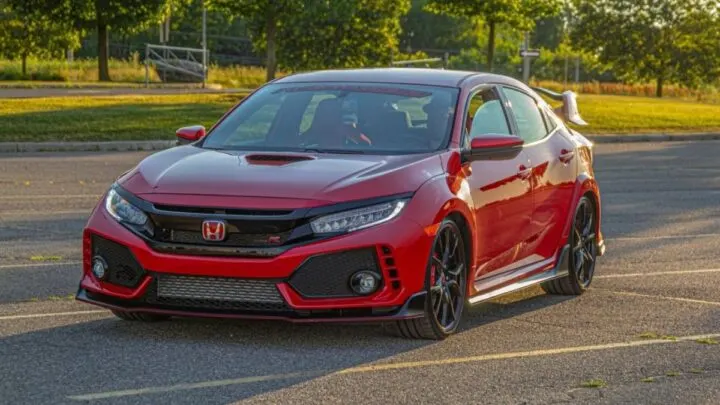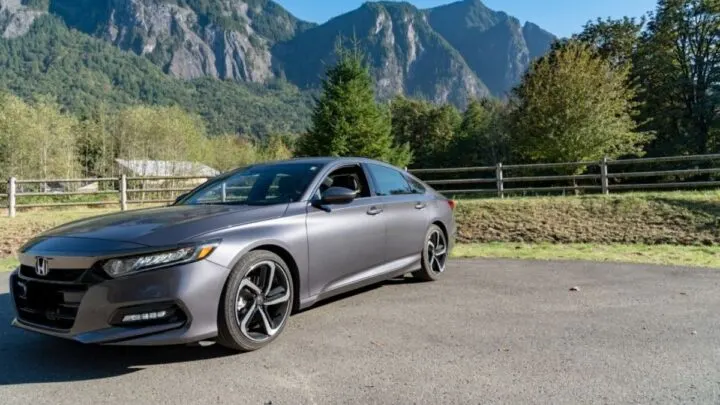The Honda Accord and Civic are undoubtedly two popular models in Honda’s lineup of affordable and reliable vehicles.
The two sedans have good fuel economies, exemplary safety ratings, state-of-the-art technology, and well-engineered chassis.
The Honda Accord usually has a larger interior and offers better engine performance, while the Civic has better overall fuel economy and a better price tag.
But why do some people prefer one and not the other? How do they compare side by side?
Let’s take a closer look.
Engine Specs and Performance
Powertrain and drivetrain specifications and performance are crucial considerations when buying any vehicle.
It’s significantly more so if you compare two vehicles with closely related features manufactured by the same manufacturer.
Actually, the Honda Accord and Honda Civic have some of the most efficient sedan engines and drivetrains just for you.
Let’s look at how they compare.
Honda Accord
The Honda Accord has two engine options available in all its trims. Across the lineup, the cars feature a base 1.5-liter turbocharged four-cylinder engine with 192 horsepower and 192 pound-feet of torque.
The engine comes paired with a continuously variable-speed transmission (CVT) and a front-wheel-drive (FWD) drivetrain.
But our favorite configuration is the 2.0-liter turbocharged four-cylinder engine capable of producing 252 horsepower and 273 pound-feet of torque.
The engine is paired with a front-wheel-drive and a 10-speed automatic transmission that accelerates faster than the CVT transmission paired with the 1.5-liter engine.
With this engine, the Accord offers excellent performance and leans towards the sports sedan territory.
However, the increased engine size and 10-speed transmission lead to poorer fuel economy ratings.
A hybrid configuration featuring a 2.0-liter four-cylinder gasoline engine and an AC motor is also available in the Accord Hybrid lineup.
It features an innovative two-motor hybrid powertrain paired with an e-CVT to produce 212 combined horsepower.
The engine, combined with the responsiveness of the electric torque, is sufficient to get you through highway speeds and city traffic.
Furthermore, the Accord’s chassis is well-engineered for better cornering, smoother driving, and better handling.
Overall, the Accord packs features of a sports car in a family car setting.

Honda Civic
Honda redesigned the new Civics but opted to retain their famous powertrains renowned for their reliability and smoothness.
The base models come with 2.0-liter turbocharged four-cylinder engines that produce 158 horsepower and 138 pound-feet of torque.
If you need better acceleration and power delivery to the wheels, go with the available 1.5-liter turbocharged four-cylinder engine that delivers 180 horsepower and 177 pound-feet of torque.
The engine accelerates well and can achieve a 0 to 60 mph benchmark in 7.9 seconds.
And for those who feel the car should be a bit faster, the good news is that the 1.5-liter turbocharged engine delivers steady and balanced power to the wheels.
Therefore, you won’t need the full throttle to feel the ambiance of the Honda Civic.
Additionally, the car is sporty on the straights and stable around corners. Just like the Accord, its chassis is well-balanced for better stability and traction geared towards smooth and effortless driving.
Fuel Economy Figures
We might all assume that the smaller car has a better fuel economy, but that isn’t the case here. Both cars share the same but differently-tuned 1.5-liter turbocharged engine across some models.
The Accord’s engine has been tuned for better performance, slashing its fuel economy by 3 to 4 MPG compared to the Civic one.
Regardless, both cars have exemplary fuel economy figures, as shown below.
Honda Accord
Honda replaced the traditional V-6 engines in favor of the four-cylinders, and the fuel economy figures are generally positive.
One such case is the Accord Touring 2.0T with a 10-speed automatic transmission with a decent 35 MPG.
Now let’s see how other Accord powertrain and drivetrain configurations perform according to the EPA tests.
- 1.5-liter four-cylinder automatic (variable gear): 30 MPG city/ 38 MPG highway/ 33 MPG combined.
- 2.0-liter four-cylinder automatic with Hybrid: 48 MPG city/ 47 MPG highway/ 47 MPG combined.
- 1.5-liter four-cylinder automatic (AV-S7): 29 MPG city/ 35 MPG highway/ 32 MPG combined.
- 2.0-liter four-cylinder automatic with Hybrid Sport: 44 MPG city/ 41 MPG highway/ 43 MPG combined.
- 2.0-liter four-cylinder automatic (S10): 22 MPG city/ 32 MPG highway/ 26 MPG combined.
Honda Civic
Generally, the Civic has better fuel economies than the Accord across models that share the 1.5-liter turbocharged four-cylinder engines.
Let’s see how the Civic performs in the EPA fuel economy tests.
- 1.5-liter turbo four-cylinder automatic (variable gear): 36 MPG city/ 42 MPG highway/ 36 MPG combined.
- 2.0-liter four-cylinder automatic (variable gear): 31 MPG city/ 40 MPG highway/ 35 MPG combined.
- 1.5-liter turbo four-cylinder automatic (AV-S7): 31 MPG city/ 48 MPG highway/ 34 MPG combined.
Manufacturer Suggested Retail Price Differences
Buying a suitable car is a daunting task when you need one with a balance of good features, reliability, and excellent fuel economy but at fair pricing.
But in today’s regard, both the Civic and the Accord are good value for money picks. Let’s look at how they compare.

Honda Accord
- LX: $27,615
- Hybrid: $28,815
- Sport: $30,075
- Sport SE: $31,565
- EX-L: $33,935
- Touring: $39,545
Honda Civic
- LX sedan: $23,645
- LX hatchback: $24,645
- Sport sedan: $25,045
- Sport hatchback: $25,115
- EX sedan: $26,645
- EX-L hatchback: $28,345
- Touring sedan: $30,245
- Sport Touring hatchback: $31,145
Interior, Comfort, and Cargo
The Accord’s interior is spacious, especially as it seats five people comfortably with sufficient head and leg room.
The front seats have similar spacing, but the back row has more legroom (3 inches more) than the Civic.
And a reason for the generous leg room is that the Accord’s wheelbase is almost 10 inches longer than the Civic’s. You should go with the Accord if you enjoy road trips with friends.
Additionally, the Accord has 1.9 additional cubic feet of cargo volume than the Civic. The Accord has 167 cubic-feet cargo hold compared to the Civic’s 14.8 cubic feet.
Nonetheless, the Civic hatchback has more cargo space than any Accord, especially with its second-row seats folded. Folding the second-row seats avails 24.5 cubic feet of cargo space for your luggage.
Summing Up Honda Accord vs. Honda Civic
The Accord and the Civic share Honda’s driver safety and assistance features and perform highly in simulated road crash tests.
However, the Accord beats the Civic with its available hybrid variant, larger cargo and passenger volumes, and a 2.0-liter turbocharged maximum performance engine.
Conversely, the Civic has better fuel economy, is more compact, is available in sedan and hatchback variants, and has a lower MSRP than the Accord.
